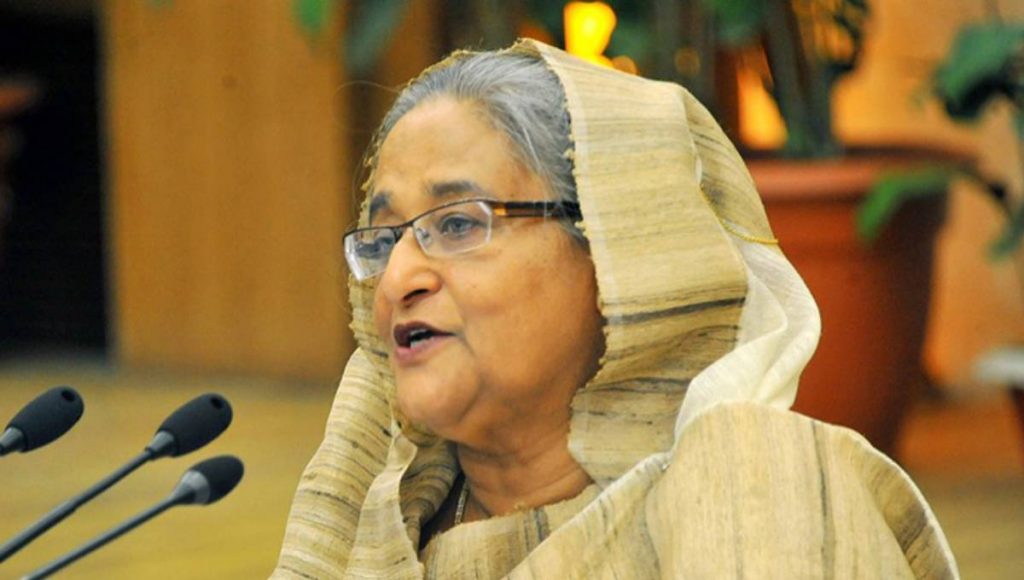Bandar Seri Begawan, Apr 23 (UNB) – Bangladesh and Brunei have agreed to explore the possibility of comprehensive collaboration in the energy sector amid the growing demand for energy in Bangladesh to support the rapid economic growth.
Prime Minister Sheikh Hasina and Brunei’s Sultan Haji Hassanal Bolkiah also agreed to encourage the relevant agencies from both sides to continue discussions to identify specific areas and modalities of cooperation in this sector, according to a joint statement issued on Tuesday.
The 20-point joint statement was issued as the Prime Minister wrapped her three-day visit to Southeast Asian country exploring ways to strengthen their cooperation to elevate the relationship to a newer height.
The two countries are looking for comprehensive collaboration in the energy sector via a Government-to-Government (G2G) arrangement, including liquefied natural gas (LNG) supply to Bangladesh as well as the participation of both public and private sectors; covering areas such as investments and trade in petro-chemicals, offshore oil and gas exploration, technical collaboration, and capacity building.
The two countries agreed to further deepen cooperation in the regional and international fora, including the United Nations; the Organisation of Islamic Cooperation (OIC); the Commonwealth and the Asean Regional Forum on issues of common interests and concerns, including extremism, terrorism, environmental protection; and sustainable development.
Both sides agreed to work together to promote a rules-based framework, peace, stability, and prosperity of the region and the world.
The two leaders recognised the potentials for investments and will encourage the promotion of reciprocal investments between the two countries in their mutual interest, particularly in sectors such as food processing, energy, ICT, shipbuilding, manufacturing, tourism infrastructure, blue economy and the jute industry.
Brunei Darussalam acknowledged Bangladesh’s humanitarian assistance and repatriation initiatives for 1.1 million people displaced from the Rakhine State, temporarily sheltered in Bangladesh.
It commended Bangladesh humanitarian gesture and generous assistance as well as the efforts towards their safe, dignified, voluntary, and sustainable repatriation.
Bangladesh appreciated the continued invaluable support and contribution of Brunei, including financial assistance and provision of critical medical and health assistance, to the field hospital in Cox’s Bazar.
Brunei Darussalam acknowledged the success of Bangladesh in the food and agricultural sector and welcomed collaboration with Bangladesh in agriculture, aquaculture, fisheries, and livestock sectors.
Both countries will explore potential bilateral trade in agricultural and food products and collaboration in farming and agro-processing taking into account respective national development priorities.
The two leaders will actively consider the possibility of a preferential trade arrangement under appropriate mechanism and to conduct a joint feasibility study to this effect.
Brunei Darussalam expressed interest to explore participation in the global halal food market by taking advantage of the special economic zones of Bangladesh and the proven expertise of Brunei in halal food industry.
Both sides will, subject to mutual agreement and capacity requirement, further strengthen cooperation in the health sector such as training and recruitment of healthcare professionals, manufacturing and trade in pharmaceuticals, as well as collaboration in specialised healthcare services.
The two countries encouraged closer cooperation among the financial institutions of the two countries to enhance the operation of financial services for effective facilitation of bilateral trade and exchanges.
The leaders expressed satisfaction over the existing cooperation and engagements among the defence forces of the two countries in mutually beneficial areas, including personnel training.
Both sides will encourage deeper cooperation in defence particularly in capacity building, knowledge sharing, peace-building and humanitarian operations.
Recognising the importance of people-to-people exchanges in strengthening bilateral relations, the leaders agreed to continue efforts to foster wider and deeper collaboration among academic institutions through visits, training programmes, student and staff mobility, information exchange, and research and development.
The two sides agreed to actively consider improving connectivity between the two countries and welcomed for an early signing of the Air Services Agreement.
Both leaders acknowledged Bangladesh’s continued interest to strengthen its relations with Asean and agreed that there is much potential in developing cooperation that can be mutually beneficial.
The leaders witnessed the signing of six Memoranda of Understanding in the areas of scientific and technical cooperation in agriculture; fisheries; livestock; supply of liquefied natural gas (LNG); youth and sports; and art and culture.
They also welcomed the exchange of notes on the visa waiver arrangement for diplomatic and official passports for both countries.
The two leaders expressed conviction that these bilateral instruments will take the relationship between the two countries to new heights in the future.




